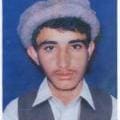Waiting in Limbo
 Obaidullah was captured from his home in Afghanistan during a night raid by U.S. Special Forces in July 2002. The raid was conducted on a tip from an unknown source. For more than 13 years, he has been incarcerated without trial some 8,000 miles from his home and family in Afghanistan. His daughter, born two days before he was taken into custody, is now 11 years old. He has never touched or held her, only recently making his first contact with her, over videophone from the detention facility at Guantánamo Bay.
Obaidullah was captured from his home in Afghanistan during a night raid by U.S. Special Forces in July 2002. The raid was conducted on a tip from an unknown source. For more than 13 years, he has been incarcerated without trial some 8,000 miles from his home and family in Afghanistan. His daughter, born two days before he was taken into custody, is now 11 years old. He has never touched or held her, only recently making his first contact with her, over videophone from the detention facility at Guantánamo Bay.
Obaidullah was taken first to the prison at Bagram, where he was held until October 2002. During that time, he describes brutal treatment. The guards chained his arms above his head for extended periods of time, and often forced him to defecate on himself by refusing him a toilet. A guard slammed him into a door, resulting in a broken and bloody nose. He says he received no medical treatment for this incident. He was once bound by the arms and legs and slammed to the ground feet first, feeling as if his heel had been broken. He was subjected to sleep deprivation and to multiple beatings. He was forced to carry and clean the barrel- like containers that were used as detainee toilets and to clean a hall, sometimes using only a toothbrush. Interrogators told him that if he did not cooperate with them, “these kinds of punishments would continue for my whole life.” He was threatened with sexual abuse during interrogations.
In October 2002, he was transferred to Guantánamo, where he has been ever since. In 2013, after more than a decade in Guantánamo, he participated in a hunger strike for several months. Since the day he was picked up, the U.S. government has justified Obaidullah’s detention based on a flawed legal framework in what it then called the “global war on terror,” pursuant to which the U.S. considers that it can hold Obaidullah and other detainees until the U.S. determines hostilities to have ended.
